The Samsung Galaxy Tab S2 Review
by Brandon Chester on October 15, 2015 8:00 AM ESTBattery Life
Modern tablets typically haven't struggled to last users through the day. Even the original iPad was rated for ten hours of usage, and most tablets from various vendors tend to hit or exceed this target in workloads like web browsing and watching video. However, as manufacturers have tried to slim down their tablets and reduce their mass, they have had to decrease the sizes of the batteries they include. While this can be offset by reductions in overall platform power, if it isn't offset the tablet can struggle to last throughout the day even when performing relatively lightweight tasks.
When the Tab S2 was originally announced I saw concerns regarding the battery capacity of both models. The original Tab S tablets were already very thin, and with both Tab S2 tablets again being the thinnest in their class Samsung has had to reduce the battery capacity of each model. What's also concerning is that the original Tab S tablets had some battery life issues of their own. However, there's really no way to gauge battery life just by looking at a device's battery capacity, and so we turn to our standard suite of battery tests which includes a WiFi web browsing rundown, a video playback test, BaseMark OS II's battery test, PCMark's battery test, and GFXBench 3's battery test.
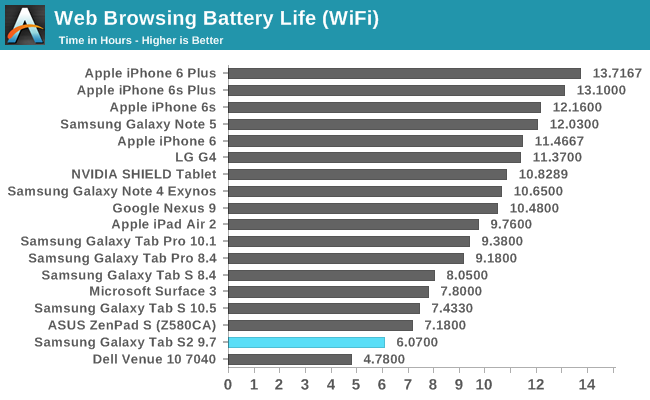
Our web browsing battery life test is mostly display bound, and the Tab S2 does not fare well during it. At 6.07 hours, it's our second lowest result, beating only the Dell Venue 10 7040 which I noted for having exceptionally poor web browsing battery life. It's almost a given that this result is due to the power required by the display, as the high level of white on a common web page will increase AMOLED power consumption dramatically. The results of this test make me question some of the design decisions made during the creation of the Tab S2. Clearly this sort of problem would have shown up during testing, and the Tab S2's platform power is obviously higher than the internal battery can support for an acceptable length of time.
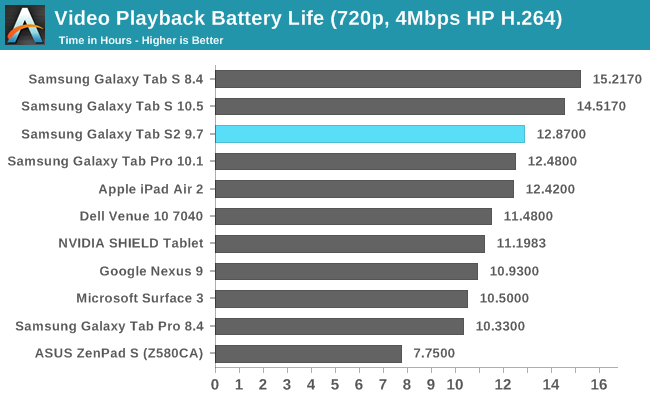
Like its predecessors, the Tab S2 does very well in our video playback battery test. Since the power usage of decoding video is essentially a fixed amount this result is also dependant on display power. In the case of AMOLED devices, the ability to turn off black pixels is a huge advantage and results in the category leading scores that you see above. The smaller battery of the Tab S2 is likely what leads to it trailing the original Tab S tablets by a couple of hours, and while the Tab S2 definitely won't be as good as its predecessors for watching films due to its aspect ratio, it still lasts more than long enough for anyone to sit on a plane or train and watch several films or a season of a TV show.
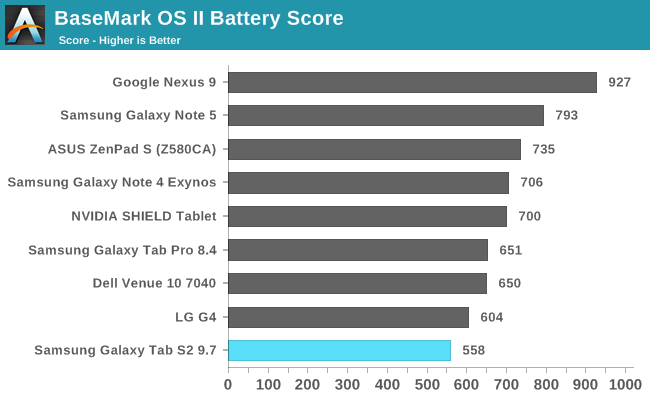
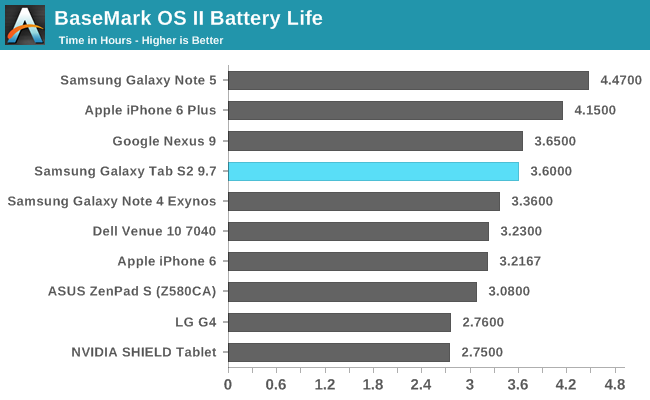
At first glance, the Tab S2 appears to do well in BaseMark OS II's battery test. Its run time is above the median, which should be a good thing. Unfortunately, this test really has two parts to it. Because the BaseMark battery test runs a CPU load over time one has to consider how performant a device was during the duration of the test. In the case of the Tab S2, I saw some of the lowest levels of CPU usage that I've ever seen on a mobile device. The impact of this can be seen in BaseMark's battery score for the Tab S2, which is the lowest device on record. In that sense, the result of BaseMark OS II is actually not favorable for the Tab S2, as it only achieved its run time due to low CPU usage during the test period.
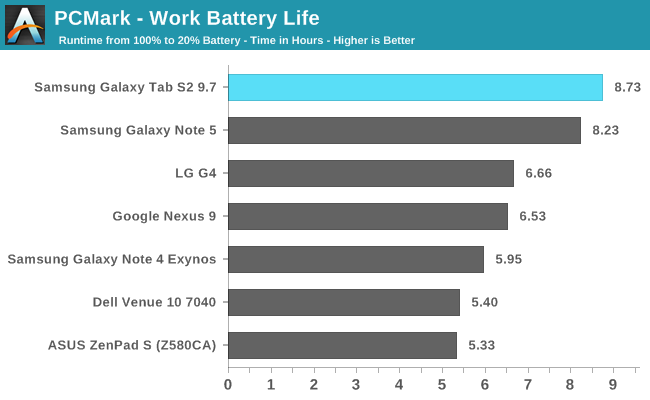
Based on the results so far I wasn't hopeful for a great battery runtime in PCMark's battery test. I was actually quite surprised when the test finished and I saw the Tab S2 with a score far greater than any other tablet. I believe this is because of the relatively long CPU idle periods and lower average display APL than our web browsing test or BaseMark OS II's battery test. What this says is that the Tab S2 is capable of good battery life in a very mixed and balanced workload, but if you're performing any display or CPU heavy tasks for any significant period of time you're going to experience the high levels of battery drain demonstrated in the earlier tests.
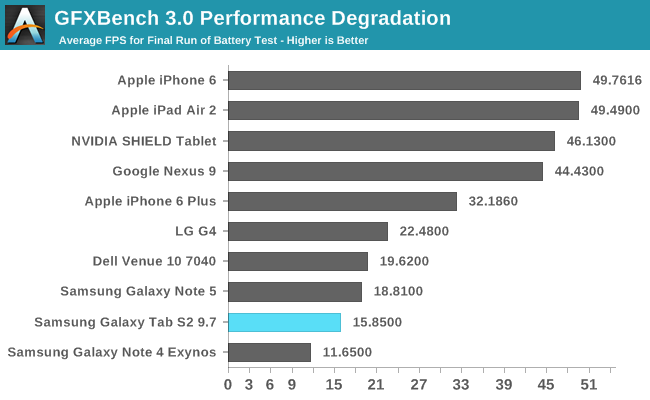
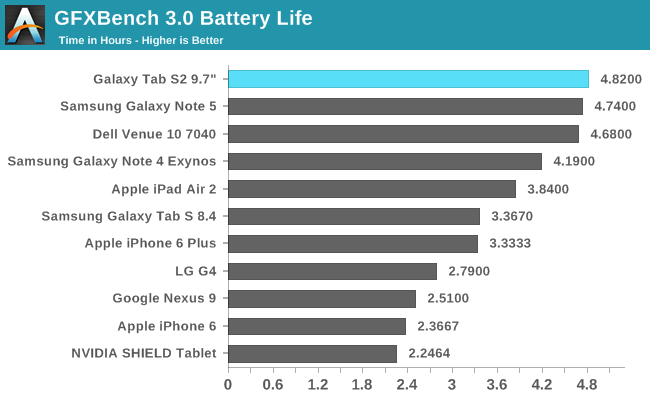
In GFXBench's battery benchmark test the Galaxy Tab S2 lasts for a very long period of time. However, this test really has two sides to it. While a device can last a long time, if it maintains a completely unplayable frame rate for the duration of the test then it's not really providing a better experience than a device that lasts half as long but runs at a very high frame rate which would actually be playable if the user was experiencing this type of workload while playing a game.
In this case, the Tab S2 is never even able to reach a frame rate of 30fps, and after around 25 minutes performance has dropped to 17fps. In contrast, the iPad Air 2 dies an hour before the Tab S2 does, but achieves a frame rate of around 50fps and maintains it for the entire time period. The Nexus 9 only lasts two and a half hours, but also achieves a very high frame rate during the benchmark. These results are a good example of how the gap between the GPU performance of the Tab S2 and the iPad Air 2 and Nexus 9 is actually much larger in the real world than single run GPU benchmarks show.
I think the Galaxy Tab S2 is definitely a case where a thin chassis was prioritized to the point where battery life suffered, and I don't believe that it was the right call. While the Tab S2 handily beats every other full sized tablet on thickness and mass, the battery life falls short in several situations. Web browsing battery life is not even close to where it should be, and BaseMark OS II shows that in a sustained CPU heavy workload the Tab S2 has to maintain a very low level of CPU performance to achieve the run time that it does. PCMark shows than in a heavily mixed workload there is the possibility of good battery life, but in my own experience which tends more toward web browsing, news reading, and working in Microsoft Office I've experienced battery life much closer to the results of BaseMark OS II and our web browsing test than PCMark's battery test.
Charge Time
Since tablets have significantly larger batteries than most smartphones they have been shipping with high wattage chargers since before fast charging came to smartphones. Unfortunately, the Tab S2 is an exception to this trend, and doesn't have any support for fast charging. I actually wasn't even sent the standard Samsung charging block along with the tablet, and since there's no fast charging support I just charged it with my 18W QC2.0 charger to ensure the block was more than capable of supplying 5W to the tablet.
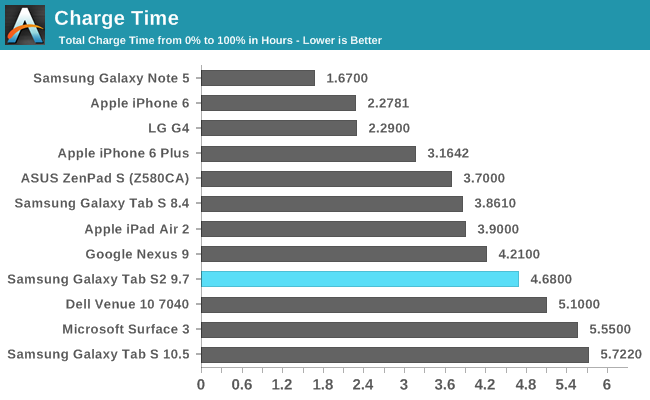
The Tab S2 takes 4.68 hours to charge, and considering its small battery capacity and the battery life sacrifices made because of it I think this was a big mistake on Samsung's part. If you're doing any CPU intensive tasks or doing a lot of web browsing it's very possible that it could take as long to recharge the Tab S2 as it lasted on battery. Suffice to say, both the battery life and the charging time on the Tab S2 are less than stellar.











162 Comments
View All Comments
osxandwindows - Thursday, October 15, 2015 - link
@FlyBriWhat if you could get an iPad screen on an iPhone?
lilmoe - Thursday, October 15, 2015 - link
You have all the right to disagree. These are only opinions, Yours and mine. These opinions might be very different from Samsung's research and design decisions. I've simply stated a *possibility* for their alleged "compromise(s)". Who knows, Samsung probably decided to skip the 7420 because of low yield, and they prioritized their flagship smartphones over their tablets.That said, liking the iPad's LCD has nothing to do with the price difference. AMOLED is still more expensive to manufacture. I would argue that OLED is generally more appealing to consumers and more pleasing to the eyes. Samsung's AMOLED has drastically improved the past couple of years. According to my own experience, people just love the "pop"... And those who prefer color accuracy are also well served by the current generation of AMOLED.
ARM tablets are no longer the mainstream "must haves". Most people don't even use them anymore. Samsung, Apple and other manufacturers are researching the needs for specific niche consumers at this point.
For those who do, I really hardly see anyone using an ARM tablet outside of social media, browsing, watching video. Maybe a magazine here and there, but nothing else. I completely disagree that tablet users who play high-end games are any sort of majority. High end, or AAA, gaming is usually exclusive for consoles and PCs. Most tablet users play less resource intensive, casual games. Besides, there aren't even that many titles (if any) in the Play Store than can saturate the Exynos 5433, let alone Apple's A8X (most tablets sold are NOT iPad Air 2s... and game developers target lower specs for iOS). The Exynos 5433 is more than capable of running titles like Asphalt 8 and Dead Trigger just fine.
Also, tablets are used a LOT less than smartphones. Therefore, one might argue that longer battery life isn't as important as thinner, lighter profiles for current tablet consumers.
nerd1 - Thursday, October 15, 2015 - link
Check BOM of iPhones and galaxy phones. AMOLED screen are usually 3x the price of LCDs.And what can you do with that 'powerful' AP anyway? Running dumbed down mobile browser? Running crappy phone games? Playing 8K video on 2K screen?
zepi - Thursday, October 15, 2015 - link
Tablets are an odd market. People mostly seem to use them for web browsing and video viewing, where performance doesn't really matter that much. Reason is unknown. Maybe it is the matter of apps not existing for other tasks. Or maybe tablet form factor just doesn't work with anything else.I guess that mostly because of this, Android makers try to get away with putting cheap and "slow" SOC's into their tablets.
Apple hit the same issue when it was noticed that iPad sales was way slower than expected. It seems that upgrade cycles are much longer, since simple performance bumps just didn't seem to matter and there are no 24month phone-contracts like with the phones to push sales. This has obviously led to Apple's current push towards trying to transform tablet market by making iPad Air 2 & iPad Pro and putting emphasis behind the productivity use with the hopes of pushing the market towards something more than just content consumption.
MS seems to be pushing for the same thing with Surfaces, though they are coming from the desktop direction when Apple is approaching this market from mobile device direction.
Android makers... Well, as can be seen here, Samsung can only do so much with the multitasking and productivity features and Google has been quite ignorant towards pushing tablets forwards.
FlyBri - Thursday, October 15, 2015 - link
@zepi I would agree that most people use tablets for web browsing and video (probably more so for web browsing), which is why Samsung went with a 4:3 aspect ratio on the Tab S2. Since they did that, they lost their differentiating factor with the iPad. Because of this, they really needed to step it up to compete, and they pretty much failed on that front. The Tab S2 is significantly slower and gets much worse web browsing battery life than the Air 2, and the Air 2 is a year old. I have no problem with Samsung releasing the Tab S2, but it's very clear it's overpriced. For what it is and what it can do, it's a $300-350 tablet in today's market, not $500.osxandwindows - Thursday, October 15, 2015 - link
You can't really use surface touch screen for productivity, There is simply no windows productivity apps for tablet.The iPad pro is not going to fail like most people say.
The iPad pro has one advantage over the surface and that is the App Store.
zepi - Thursday, October 15, 2015 - link
It remains to be seen. Personally my guess is that both will have their supporters and both will "stay alive".osxandwindows - Thursday, October 15, 2015 - link
@zepiIts not that I don't like the concept behind the surface pro or surface book.
Its just that I don't see the use of a touch screen that can be removed.
Media consumption?, with 3 hours of battery life when removed?, I wood rather buy an iPad for that.
blackcrayon - Thursday, October 15, 2015 - link
Yeah at that point, why not have a nice laptop and a decent tablet on the side, you can even use them together for some tasks.osxandwindows - Thursday, October 15, 2015 - link
If you have a mac and an iPad pro, You will have the perfect combination.Apples continuity is pretty much like a surface use case.
Plus with lightning flash drives you will be able to save 4k video.